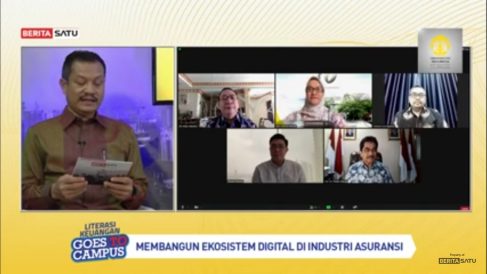Financial Literacy Goes to Campus, “Building a Digital Ecosystem in the Insurance Industry”
Nino Eka Putra ~ PR of FEB UI
DEPOK – (17/11/2020)
Financial Literacy Goes to Campus with the theme “Building a Digital Ecosystem in the Insurance Industry” held by the Financial Services Authority (OJK), Ministry of Communication and Informatics (Kemenkominfo), in collaboration with the Faculty of Economics and Business, Universitas Indonesia. The event was supported by PasarPolis, BeritaSatu TV and Investor Magazine, and was held virtually on Tuesday (17/11/2020). The event was opened by Prof. Dr. Widodo Muktiyo, Director General of Information and Public Communication Kemenkominfo RI and Dr. Beta Yulianita Gitaharie, Acting Dean of FEB UI.

Beta Yulianita Gitaharie, opened the event by giving a speech on the development of insurance in Indonesia that is increasing rapidly because of digital technology. In the future, the insurance industry will be supported by big data, artificial intelligence, and will be supported by the Internet of Things. However, what needs to be improved is the low level of insurance literacy in Indonesia. This is supported by the OJK survey, which shows the level of financial literacy in 2019 is only around 38%. Meanwhile, insurance literacy is even lower, only 19.4%. So, it is very important to continue to socialize financial literacy programs, including insurance literacy to the public.
The Financial Literacy Goes to Campus evented was attended by three speakers who are experts in their fields, namely Kristianto Andi Handoko, Deputy Director of Insurance Supervision II OJK, Cleosent Randing, CEO & Co-founder of PasarPolis, and Dr. Willem Makaliwe, Head of the Management Institute of FEB UI. Primus Dorimulu, News Director BeritaSatu Media Holdings and Chakry Miller acted as the host.
Kristianto Andi Handoko, as the first speaker, said that there has been a shift in the current insurance industry from traditional or conventional schemes to digital ecosystem-based. Covid-19 is also seen as a great opportunity for the insurance industry to make a comprehensive shift. Insurance industry players are also expected to improve the insurance process, such as innovation and product manufacturing, pricing, underwriting, and claim handling. This can be done by building on digital technology or collaborating with other ecosystems. That way, the insurance products sold will be more concise, quick to market, easy for customers to understand, and are even potentially cheaper to sell.

“From a regulatory perspective, the OJK has issued a Circular in mid-2020, which allows life insurance companies to market unit-linked products online. Basically, OJK allows the life insurance industry to innovate by utilizing the digital ecosystem, but consumer protection remains a top priority. In addition, OJK is also preparing an OJK Regulation, with the intention of supporting the shift of the insurance industry from conventional or traditional to digital,” Kristianto said.
Cleosent Randing, from PasarPolis as the second speaker, said that the large number of foreign investors entering the insurance industry in Indonesia is a challenge and opportunity in continuing to develop business, including when designing insurance products. We should not just make insurance products like those in other countries. Literacy to make suitable products for Indonesia must also be a dominant focus.

Cleo said, PasarPolis has developed a unique insurance product that only exists in Indonesia, which is intended for online motorcycle taxi drivers. It also continues to work with regulators and the insurance industry to accelerate the development of other insurance products to encourage insurance inclusion and literacy in Indonesia.
Willem Makaliwe, as the third speaker, explained that financial literacy in banking shows that 92 million of the 182 million adult population have not been exposed to banking services (based on databoks, 2019) and only 60% have bank accounts. Meanwhile, financial literacy in insurance shows that customers who are protected by life insurance are at 58.75 million people (based on AAJI, semester I-20200), including 16-17 million individuals.

“Problems that occur in banking include differences in interest rates, sunk costs (innovation and creativity), and product development. Meanwhile, the problems in insurance are in the form of the sunset industry (technological developments can kill the industry if there is no innovation), intense competition, and the lack of a digital ecosystem. This is a big homework for the insurance industry to be able to drive growth by shifting to a digital ecosystem,” Willem concluded. (hjtp)
(am)





